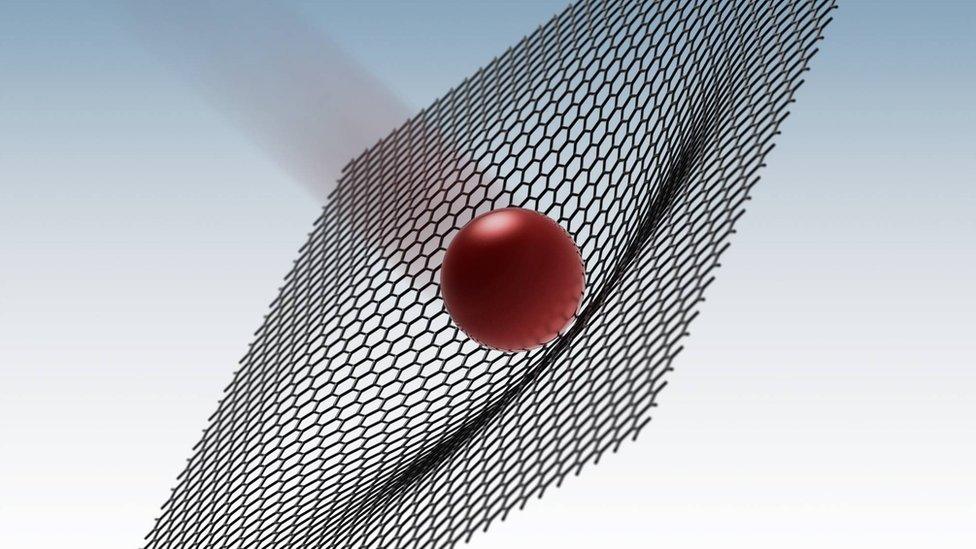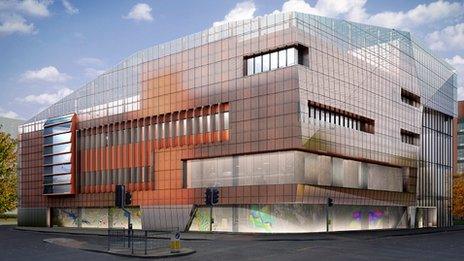Autumn Statement 2014: Manchester to get £235m science research centre
- Published

Manchester has already had success with advancements in science, including graphene's development
A new £235m science research centre has been given the go-ahead for Manchester in the Chancellor's Autumn Statement.
The Sir Henry Royce Institute for Advanced Materials Research and Innovation will also have branches in Leeds, Liverpool, London, Cambridge, Oxford and Sheffield.
The centre, based at the University of Manchester, will build on advances made in developing materials like graphene.
George Osborne called it a "massive investment" in science in the North.
Focusing on the rapidly growing field of materials science, the new centre will investigate developments across a wide range of disciplines including nanotechnology, engineering and chemistry.
The University of Manchester said the centre would be supported by "spokes" at the universities of Sheffield, Leeds, Liverpool, Cambridge, Oxford and Imperial College London.
A spokesman said the nuclear materials part of the centre, one of 14 such components, would be supported by facilities at the National Nuclear Laboratory in Cumbria and the Culham Centre for Fusion Energy in Abingdon, Oxfordshire.

In Westminster
Arif Ansari, BBC North West Tonight political reporter
The Sir Henry Royce Institute will aim to drive collaborations between academia and industry, to commercialise the UK's world-leading research in this field.
It had already been announced, but the chancellor today gave the official go-ahead.
This is separate from the £100m already announced for graphene.
Mr Osborne also confirmed a £113m investment in a Cognitive Computing Research Centre in Daresbury, which will enable non-computer specialists to gain insights from big data in order to enhance and design products and services.

Mr Osborne's science package also included a £20m Innovation Hub for Ageing Science in Newcastle-upon-Tyne and a £113m Cognitive Computing Research Centre in Daresbury, near Warrington in Cheshire.
Addressing MPs, Mr Osborne said: "Britain is raising its ambition. And nowhere is that clearer than in our commitment to science. It is a personal priority of mine.
"Scientific advance is a human endeavour worthy of support in its own right. It is also crucial to our economic future."
'Honeycomb'
The University of Manchester's vice-president, Professor Colin Bailey, said the new institute would "provide the opportunity for the UK to stay ahead in this vital area of research and innovation to ensure growth in the national economy, as well as addressing the many global challenges facing society".
The National Graphene Institute (NGI) in Manchester is currently under construction and due to open next year.
Graphene consists of a single layer of carbon atoms packed in a honeycomb structure. It has a range of applications, from drugs that can be delivered to specific cells, to bendable smartphones.
South Manchester Liberal Democrat MP John Leech welcomed Mr Osborne's announcement.
He said: "This is fantastic news for Manchester, and another big infrastructure scheme for the North West.
"It will complement the university's existing graphene hub, boost Manchester's economy, and create lots of good quality jobs building and running the centre."
Manchester City Council leader Sir Richard Leese said it was "a momentous announcement for Manchester, which adds significant momentum to the city's major role at the leading edge of global advanced material research.
"It's something for which we have long campaigned. The potential for the applications of such materials is vast and they will play a major part in realising the economic potential of Manchester, Greater Manchester and the North as a whole," he said.
- Published3 December 2014

- Published28 November 2014

- Published10 September 2014

- Published15 January 2013
